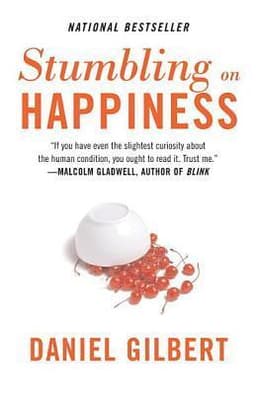
Stumbling on Happiness - 1 Minute Summary
Book by Daniel Gilbert
Read the In-Depth 15 Minute Summary
Stumbling on Happiness: A Journey Through the Quirks of the Human Mind
In his thought-provoking book, "Stumbling on Happiness," Harvard psychologist Daniel Gilbert takes us on a captivating exploration of the human mind and its peculiar relationship with happiness. Gilbert argues that our unique ability to imagine the future, while a remarkable gift, often leads us astray when predicting what will bring us joy. Through a blend of scientific research, witty anecdotes, and practical insights, the book unveils the psychological illusions that distort our visions of the future and offers valuable lessons on how we can navigate life's choices more effectively.
At the heart of Gilbert's work lies the concept of "affective forecasting," the idea that we constantly make predictions about how we'll feel in response to future events. However, our forecasts are frequently flawed due to a range of cognitive biases and limitations. We tend to overestimate the intensity and duration of our emotional reactions, neglect the power of our psychological immune system to help us adapt to negative events, and fail to account for the ways in which our preferences and circumstances may change over time. By shedding light on these common pitfalls, "Stumbling on Happiness" equips us with the knowledge needed to make more accurate predictions and better decisions.
One of the key takeaways from the book is that our minds are not always reliable narrators. Our memories are subject to distortion, our imaginations are influenced by our current emotional states, and our projections of the future are often based on oversimplified and inaccurate assumptions. Gilbert encourages us to be more mindful of these psychological quirks and to approach our own mental simulations with a healthy dose of skepticism. By recognizing the limitations of our mental time travel abilities, we can learn to base our choices on more objective data, such as the experiences of others who have faced similar situations.
Moreover, "Stumbling on Happiness" reminds us that the pursuit of happiness is not a straightforward journey. What makes us happy in the moment may not necessarily lead to long-term contentment, and our intuitions about what will bring us joy are often misguided. Gilbert suggests that instead of chasing after elusive ideals of happiness, we should focus on cultivating meaningful relationships, engaging in activities that bring us a sense of purpose, and learning to savor the small pleasures in life. By shifting our attention to the present moment and finding joy in the everyday, we can build a more resilient and satisfying existence.
In conclusion, "Stumbling on Happiness" is a revelatory look at the complex relationship between the human mind and the pursuit of happiness. By illuminating the psychological mechanisms that shape our perceptions and decisions, Daniel Gilbert provides us with a valuable roadmap for navigating life's challenges and opportunities. The book's insights encourage us to question our assumptions, learn from the experiences of others, and embrace a more flexible and adaptive approach to seeking fulfillment. Ultimately, "Stumbling on Happiness" empowers us to make more informed choices and cultivate a deeper understanding of what truly matters in our lives.

